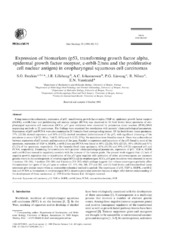| dc.description.abstract | Using immunohistochemistry, expression of p53, transforming growth factor-alpha (TGF-α), epidermal growth factor receptor (EGFR), c-erbB-2/neu and proliferating cell nuclear antigen (PCNA) was examined in 26 fresh frozen tissue specimens of oropharyngeal squamous cell carcinomas (SCCs). p53 gene mutations were examined by polymerase chain reaction (PCR)/DNA sequencing methods in 22 carcinomas. The findings were examined for correlations with patients’ clinicopathological parameters. Expressions of p53 and PCNA were also examined in 21 formalin-fixed corresponding tissues. Of the fresh frozen tissue specimens, 77% (20/26) showed expression and 68% (15/22) showed mutations (substitutions) of the p53, with significant clustering of the mutations in exons 5 (8/22; 36%), 7 (4/22; 18%) and 8 (5/22; 23%). No mutations were found in exon 6. There was a discordance between expression of p53 protein and mutations of the gene. Parallel to expression and mutations of the p53 found in most of the specimens, expression of TGF-α, EGFR, c-erbB-2/neu and PCNA was found in 88% (22/25), 92% (23/25), 58% (14/24) and 91% (21/23) of the specimens, respectively. For the formalin-fixed tissue specimens, 62% (13/21) and 90% (19/21) expressed p53 and PCNA, respectively. Examining for correlations with patients’ clinicopathological parameters, expression of p53, TGF-α, EGFR and c-erbB-2/neu seemed to negatively correlate with the increase of the tumour grade. The present work suggests that: (1) lack of negative growth regulation due to inactivation of the p53 gene together with activation of other proto-oncogenes are necessary genetic events in the carcinogenesis of oropharyngeal SCCs; (2) in oropharyngeal SCCs, p53 gene mutations were clustered in exons 5 (codons 130–186), 7 (codons 230–248) and 8 (codons 271–282) which perhaps suggests that tobacco carcinogens probably affect the mutational hot spots of the p53 gene at codons 157, 175, 186, 248, 273 and 282; and (3) fresh frozen and formalin-fixed tissue specimens give similar results when an immunohistochemical method is applied. The importance of p53, TGF-α, EGFR, c-erbB-2/neu and PCNA as biomarkers in oropharyngeal SCCs deserves particular attention because it might offer further understanding of the development of these carcinomas. | en_US |
